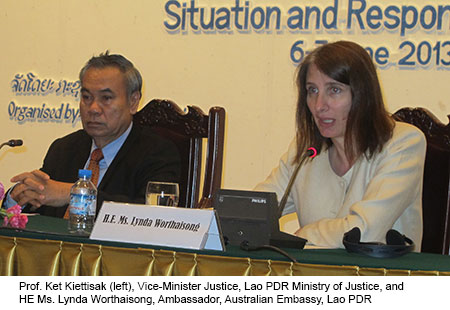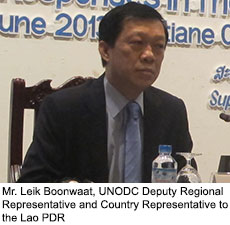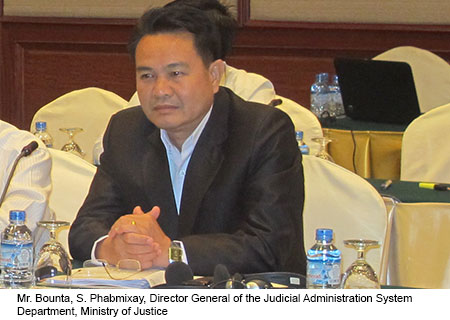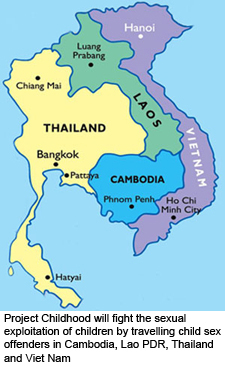
Vientiane (Lao PDR), 21 June 2013 - Beating online child sexual exploitation in travel and tourism requires better coordination between criminal justice agencies in Lao PDR and its Greater Mekong Sub-region (GMS) neighbors, said experts at a recent UNODC workshop here.
"Online sexual abuse is a growing threat throughout ASEAN that is increasingly being used by travelling child-sex offenders to facilitate direct access to children," said Ms. Margaret Akullo, Project Coordinator, Project Childhood (Protection Pillar). "We need better criminal justice coordination mechanisms including extra-territorial legislation and intelligence-sharing strategies that facilitate regional law enforcement and prosecution cooperation. We must expand counter-measures to include legislation and operations that target suspicious activities by sex offenders, including the possession of indecent images of children."
According to UNODC's
Transnational Organized Crime in East Asia and the Pacific - A Threat Assessment, the sexual exploitation of children in Southeast Asia appears especially prevalent in the Greater Mekong Sub-region countries of Cambodia, Lao PDR, Thailand and Viet Nam. Travelling child-sex offenders - the majority of them from the region - make use of these markets and also pursue children not linked to the commercial sex industry. Often, these offenders use the internet to get information on local children and the services available at their destination.
 To combat this problem and raise awareness of the issues and responses involved, Project Childhood (Protection Pillar: Lao PDR), in collaboration with the Lao PDR Ministry of Justice, organized a two-day workshop,"Child Sexual Exploitation in Travel and Tourism: Situation and Responses in the Greater Mekong Sub-region".
To combat this problem and raise awareness of the issues and responses involved, Project Childhood (Protection Pillar: Lao PDR), in collaboration with the Lao PDR Ministry of Justice, organized a two-day workshop,"Child Sexual Exploitation in Travel and Tourism: Situation and Responses in the Greater Mekong Sub-region".
Chaired by HE Prof. Ket Kiettisak, Vice-Minister of Justice, Lao PDR Ministry of Justice, the workshop was attended by HE Ms. Lynda Worthaisong, Australian Ambassador to Lao PDR, Mr. Leik Boonwaat, UNODC Deputy Regional Representative and Country Representative to the Lao PDR and over 60 other attendees. Mr Boonwaat welcomed Lao PDR's efforts in responding to child sexual exploitation in travel and tourism and stated that the workshop was very significant in sharing experiences within and across borders, and in particular, capturing lessons learned from Lao PDR's neighbouring countries.
Law enforcement and prosecutorial representatives from neighboring countries - such as the Cambodian National Police, the Thai Ministry of Justice and Office of Attorney General, the Vietnamese Ministry of Justice and Ministry of Public Security, and the Australian Federal Police - shared their experiences on prosecuting child sexual exploitation offences and discussed strengthening legislative frameworks and better use of technology to more effectively investigate and prosecute offenders, particularly for online sexual offences.
The Australian Federal Police, presented a case study on a successful operation that led to the arrest of 184 child sex offenders who used technology to access their victims.

"Offenders were arrested in the United Kingdom, the United States, New Zealand, Australia, and Thailand," said a Liaison Officer of the Australian Federal Police. "The three-year joint operation with other law enforcement agencies identified many other members of a website who had a sexual interest in young boys."
The workshop also discussed how best to collect information to draft legal provisions to address gaps in Lao PDR legislative frameworks.
In response to recommendations from the UNODC Legal Analysis and Implementation report (2012), the Lao PDR's Legal Responsible Committee agreed to a July 2013 meeting where members will present existing data on child sexual exploitation and information gaps.
Background:
 Project Childhood is a $7.5 million Australian AID (AusAID) funded initiative to combat the sexual exploitation of children - mainly in the travel and tourism sectors - in the Greater Mekong sub-region. The project focuses on Cambodia, Lao PDR, Thailand, and Viet Nam and builds on Australia's long-term support for programs that better protect children and prevent their abuse. Project Childhood is being implemented in two complementary pillars- the Protection Pillar, a partnership between UNODC and
INTERPOL, and the Prevention Pillar, implemented by
World Vision.
Project Childhood is a $7.5 million Australian AID (AusAID) funded initiative to combat the sexual exploitation of children - mainly in the travel and tourism sectors - in the Greater Mekong sub-region. The project focuses on Cambodia, Lao PDR, Thailand, and Viet Nam and builds on Australia's long-term support for programs that better protect children and prevent their abuse. Project Childhood is being implemented in two complementary pillars- the Protection Pillar, a partnership between UNODC and
INTERPOL, and the Prevention Pillar, implemented by
World Vision.
Project Childhood (Protection Pillar) aims to enhance law enforcement capacity to identify, arrest, and prosecute traveling child-sex offenders in the Mekong region. To achieve these objectives, Project Childhood works closely with police, justice officials, and other stakeholders in the four project countries.
![]()